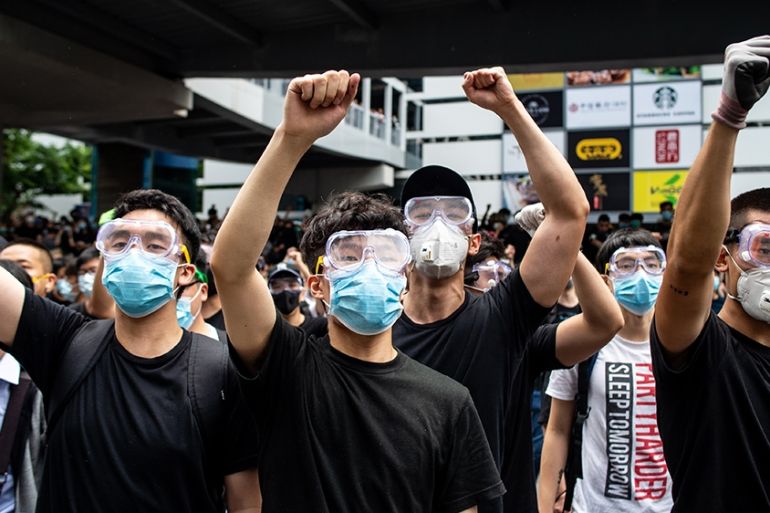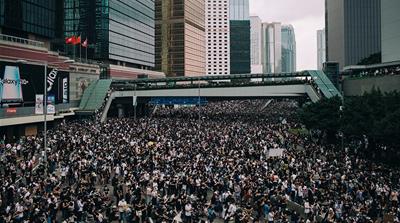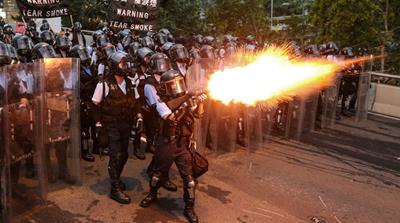‘A financial fight’: Hong Kong protesters target the economy
Some protesters say damaging parts of the economy in the short term will help save Hong Kong’s autonomy for the future.

Teargas, rubber-coated bullets, police in riot gear and protesters in hospital. It has been an unusually violent week in Hong Kong, where some people against a proposed extradition law are taking on a new target as part of their fight: the Chinese territory’s economy.
The street protests that have brought hundreds of thousands onto the city’s streets look set to continue against the bill that would allow mainland China to request the extradition of suspects from Hong Kong.
Keep reading
list of 4 itemsHong Kong’s new security law comes into force amid human rights concerns
Hong Kong passes tough new national security law
What is Article 23, Hong Kong’s new draconian national security law?
Some believe that the proposal, if passed, would ultimately undermine the territory. And they are shutting down shops, going on strike and even calling for a sell-off of Hong Kong’s currency – all relatively new weapons in their fight to maintain the city’s autonomy.
Some of these people say that inflicting short-term economic pain will highlight the need to preserve the laws and freedoms that Hong Kong has enjoyed since the United Kingdom handed it back to Beijing in 1997 under the so-called “one country, two systems” agreement.
According to a list compiled by former students from the Education University of Hong Kong, 1,229 businesses heeded a call – spread over social media – to shut down on Thursday. The list names firms in the retail, media, legal, hospitality and many other sectors.
‘Domino effect’
Conrad Fu, the founder of local transport startup Call4Van, was among the first business owners to suspend operations in sympathy with the protesters.
“Hong Kong has a well-established legal system that has been trusted by many foreign businesses and investors. The extradition law can scare them away. This could have a domino effect on Hong Kong’s economy, whose cornerstone is the financial industry,” Fu told Al Jazeera.
The belief in Hong Kong’s strong legal system and protections attracted 8,754 businesses with parent companies outside Hong Kong last year, according to investment promotion agency InvestHK.
“If one brick is taken away, the whole infrastructure will start to collapse slowly … We are just losing two or three weeks’ revenue. But compared to the long-term damage that can be done to Hong Kong and its people, our loss is nothing,” Fu said.
The protesters aren’t the only ones who believe this.

Fitch Ratings warned of the possibility of downgrades to Hong Kong’s credit score if its autonomy is compromised. A lower credit rating could translate to higher interest payments on its government debts.
“A move towards greater alignment of institutional and regulatory frameworks that diminish the autonomy of Hong Kong with respect to the factors that support its higher credit rating relative to mainland China would cause the rating differential to come under review,” Fitch said in a statement.
Bank borrowing costs have gone up even without ratings downgrades. Hong Kong’s one-month interbank borrowing rate rose on Friday to its highest level since 2008, according to data from Bloomberg. And the city’s main stock index, the Hang Seng, fell nearly two percent over the week.
‘Foreign masters’
An editorial in the mainland’s state-run China Daily newspaper this week defended the proposed law, saying it “satisfies all the requirements of relevant international conventions and suits Hong Kong’s status as an international city with a mature legal system”. The editorial added: “The opposition camp and its foreign masters seem willing to oppose it for their own purposes at the expense of the city’s rule of law, public safety and justice”.
The protesters succeeded in forcing the Legislative Council, Hong Kong’s parliament, to delay a debate on the law this week but the territory’s government remains committed to passing it before the end of the month. The demonstrations began on Sunday and turned violent on Wednesday, when protesters blocked access to the Legislative Council building.
The demonstrations have caused widespread disruptions to daily life, which will translate into lost revenue for many firms.
On Wednesday, as businesses shut down, many staff were given the choice to work from home. Bus and subway services were diverted or suspended. Shops and banks around the protest areas were closed. Pacific Place, a high-end shopping mall near government buildings, closed for the day on Thursday.
But rather than viewing the economic costs of the protests as mere collateral damage, some of the people against the bill want to weaponise the economy and its world-class financial system as part of their fight.
For instance, Tree Li, a 28-year-old Hong Kong accountant, is urging people to sell off their Hong Kong dollars.
“We have no choice but to start a financial fight to force the government to revoke the extradition bill,” Li told Al Jazeera. “The ways we protested before are not working anymore.”

“If Hong Kongers do not feel confident about the government or the Hong Kong dollar, they can choose to convert their assets into US dollars and take them out of the local banks. They can hold cash or deposit the money in offshore bank accounts,” Li said. “This is not what the government wants.”
Li’s campaign has attracted around 9,000 likes on Facebook.
“Without rule of law, foreign investors would lose confidence in Hong Kong and sell off their assets in the city,” he says.
Li and other observers worry that once the bill is passed, the protection that the international city provides its residents and businesspeople will disappear.
Aggressive response
The police response to the protests was swift and more aggressive than their actions during the 2014 pro-democracy demonstrations. Police Commissioner Stephen Lo Wai-chung told reporters on Wednesday that riot officers used batons, pepper spray, beanbag rounds, rubber-coated bullets, water hoses and teargas against the demonstrators.
The 2014 protests shut down the key business district of Hong Kong for 79 days.
The economic impact of those events was limited, analysts say. But even though Hong Kong rebounded, the protests left a cloud of uncertainty over the future of the city’s autonomy.
This time around, those doubts could become more permanent, particularly if the government passes the extradition law, they say.
Gillem Tulloch, the founder of accounting research firm GMT Research, told Al Jazeera that his company will wait until the bill is passed to decide if it should shift operations to Singapore or the UK.
“It would be more difficult to do business in Hong Kong and we worry about the safety of our staff. We produce a lot of highly critical analysis of Chinese companies. There could be retaliation from China by different means,” Tulloch said.
Hong Kong’s reputation as one of the freest economies in the world may already be taking a hit.
In a statement praising the protesters as “courageous”, United States Congress House Speaker Nancy Pelosi suggested reviewing the US’s policy of treating Hong Kong as a separate entity from mainland China.
The revocation of the United States-Hong Kong Policy Act of 1992 would mean that the US no longer treats Hong Kong as independent. A possible effect of such a move would be that all the tariffs the US has levied against mainland China in its trade war would also apply to Hong Kong, damaging its huge trade and logistics industries.
“If it is no longer an independent economic entity that can attract foreign capital, its trade and financial system could collapse,” Jack Fung, a researcher at the Hong Kong Policy Research Institute, told Al Jazeera.
Already, a group of US congresspeople has agreed to put forward a bill to revoke Hong Kong’s status.
The US Department of State said the proposed amendments to Hong Kong’s extradition law lack procedural protections and “undermine Hong Kong’s autonomy and negatively impact the territory’s long-standing protections”.
They also “damage Hong Kong’s business environment and subject our citizens residing in or visiting Hong Kong to China’s capricious judicial system”, it said.